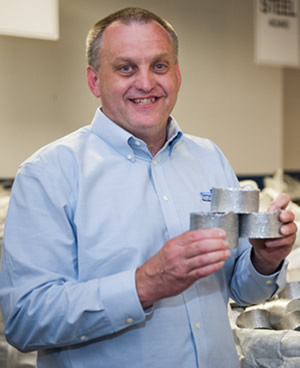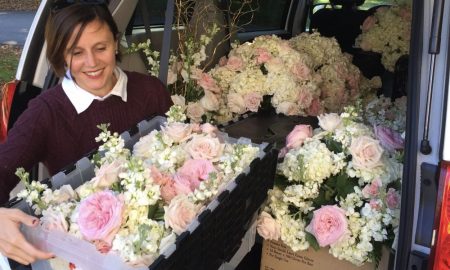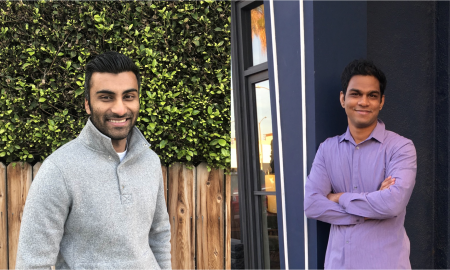

Today we’d like to introduce you to Woody Bigos.
Woody, let’s start with your story. We’d love to hear how you got started and how the journey has been so far.
While working for a high-end turbo-machinery manufacturer, I was approached by my boss who said, “Woody, metal chips and fluids are a mess, and they will always be a mess until someone finds a better way. I want you to figure it out.” I then dove in to better understand what the problem was and how it might be solved. I quickly found that two problems existed.
Scrap metal chips were saturated with fluid which significantly decreased the value of the metal along with adding and environmental exposure to the manufacturer. Secondly, the amount of fluid contained within the metal chips was staggering, every gallon of fluid that was exiting with the metal chips had to be replaced with brand new product and created a disposal problem for the metal recycler, all of which was adding significant costs.
These fluids are known as Metal working fluids and are used when machining various types of metal. Currently more than 200 million gallons of these fluids are disposed of in New England alone and NE only accounts for 11% of the North American market. This is not sustainable. I experimented for six to twelve months until to develop a process that solved the problem. I then approached the CEO of the company and presented an action plan and ROI to which he responded, “OK, why don’t you go ahead and do it”. I replied, “Are you authorizing me to purchase the equipment?” The response I received was a surprise to me. I was told that if I found a way to purchase the equipment, I would be allowed to use up to 7000 ft2 in their new addition but I only had three years to move into my own building. We purchased the building we currently operate in two years later. Shortly after the move we applied for a patent of our “re:cool” process. We were recently informed that we could expect to have that patent in hand in about 3 months.
Great, so let’s dig a little deeper into the story – has it been an easy path overall and if not, what were the challenges you’ve had to overcome?
As with any business the constantly changing economic climate presents challenges that are overcome by experience. Not having a great wealth of business experience meant as a company we had to rally as a team and get in the trenches and fight our way through.
Although this approach is not without pain, the multi-faceted gains of overcoming the challenge at hand, absorbing the experience, and building a stronger team the end result is worth the effort.
A constant challenge for us is being on the cutting edge. Although on the surface most people would view this as a great advantage, and it truly is, getting industries and established companies to change is hard work. It has been said often of very large corporations, it takes a miracle to get in and dynamite to get out. The good news for us is that once we have the opportunity to prove our process we gain a very loyal and committed customer.
A struggle that I expect we will always need to be prepared for is the fact that we are challenging two very antiquated and complacent industries. These are the scrap metal industry and big oil. Complacency rarely leads to sustainability, especially when sustainability leads to reduced profits. I often tell potential clients that we offer a two tone green, that is to say that we offer a real green alternative in our recycling process and at the same time we offer increased profitability.
Please tell us about Simple Life Recycling.
As a company, we specialize in Metal Working Fluids. We reclaim, recondition, reuse, manage and monitor these fluids.
What I am most proud of is our core value of “Find a better way”. this concept was the at the founding of our company and it continues to ring true today. The following is an example of what I mean. In our community of Rochester NH, it is impossible to find anyone who has not been affected by the opioid crisis. There are presently a number of programs along with efforts to increase awareness to address this crisis. looking through the lens of “Find a better way”, we asked the question “What can we do as a company to help”. I had the thought that instead of trying to harvest, what could we plant. We have hired a number of employees who successfully completed a program but found themselves in the gap between rehabilitation and self-sufficiency. If we could just help one person that would affect one family, one neighborhood and our collective community. I was told by a subcontractor recently that when he dropped his dog off at doggie daycare the owner asked where he was headed. He told them he was doing some work for Simple Life Recycling. The owner then said to him, they are a great company.
When asked how they knew about SLR, he was told that SLR hired their nephew who was addicted to opioids and was not able to find work after completing his program.
SLR gave him a chance and stood by him while he progressed. Learning of this when I know this person has never seen our operation or met our staff tells me that as a company we are making a real difference in our community not just profits and jobs. I am most proud of this.
Do you look back particularly fondly on any memories from childhood?
Being one of nine children, my family was always focused on survival. One of our survival strategies was picking potatoes. We lived in house surrounded by a huge potato
farm. After harvesting his field, the farmer let people come and take what was left behind—as long as you asked permission. My father had no problem asking. So we Bigos’ gathered potatoes, and potatoes and potatoes! We gathered enough potatoes to last until the next year. I will always remember gathering potatoes, filling burlap sacks and loading them into our basement. The whole time I felt like I was treasure hunting.
This experience changed me and taught me many lessons. I learned a phenomenon that shaped my perspective and posture going forward from that day. Where there is a fertile, productive field, there will be left overs and those left overs will be either waste or opportunities.
If the farmer went back for the left overs it would cost too much. It would have been inefficient for him to get the left overs. He needed to get his harvest to market, maintain his equipment, run his farm—he couldn’t bother with the left overs, the remnants. For him to succeed he had to keep his eye on his goal.
For the farmer to do what he needed to do, he had to leave something behind. Was it waste or opportunity? My father saw the opportunity and he took initiative. He wasn’t afraid, and he taught us to not be afraid, to get our hands dirty, work hard.
A value was born—with vision and hard work, waste is an opportunity.
Contact Info:
- Address: 9 Great Falls Avenue, Suite 3
Rochester, NH 03867 - Website: simpleliferecycling.com
- Phone: (603) 948-1181
- Email: info@simpleliferecycling.com








Getting in touch: BostonVoyager is built on recommendations from the community; it’s how we uncover hidden gems, so if you know someone who deserves recognition please let us know here.
















